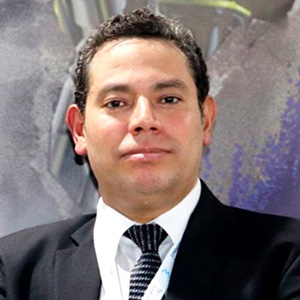
Ahmed S. Elsheikh specializes in helping executives, managers, and decision-makers shape their digital transformation and technology monetization strategies. With extensive experience across diverse strategies, business models, methodologies, frameworks, and technologies – including FinTech, AI, the Metaverse, data analytics, business/enterprise architecture, blockchain, Lean Six Sigma, TOGAF, CMMI, and Agile – Ahmed offers a holistic approach to navigating the digital economy. He also assists organizations in implementing these strategies effectively, leveraging governance frameworks such as Balanced Scorecards (BSCs), COBIT, and Objectives and Key Results (OKRs).
Ahmed earned a research-based Executive Doctorate of Business Administration (EDBA), focusing on Digital Platforms and Ecosystem Strategies, through dual degrees from SKEMA Business School (France), the Business Science Institute (Luxembourg), and iaeLyon School of Management (France). He also holds an MBA in Strategic Management from Warwick Business School (UK) and an MSc in Computer Engineering from the Arab Academy for Science and Technology (Egypt).
Throughout his career, Ahmed has gained diverse professional experience in roles such as R&D Manager, C-Suite Advisor (to CDOs, CDAOs, CDAIOs, CTOs, CIOs, and COOs), Business and Enterprise Architect, and Executive Coach. Previously, he served as a Senior R&D Expert, Management Consultant, Service Manager, Product Manager, Quality Expert, and Quality Manager. This multifaceted background has shaped his unique “T-shaped” skills profile, equipping him to drive growth and innovation in today’s disruptive economy.
Ahmed also holds numerous professional credentials from leading organizations, including The Open Group, Scrum Alliance, ISACA, the CMMI Institute, and the AIPMM, as well as certificates from Coursera specializations and courses.
Thesis Direction
Pr Xavier Lecocq
Thesis Title
Digital Services Platform Strategy: A Qualitative System Dynamics Approach With Grounded Theory For Platform-Based Ecosystems.
Abstract
The emergence of digital platform business models has revolutionized how organizations overcome physical limitations and achieve unprecedented levels of success. Over time, these platforms have evolved into strategic enablers, driving not only individual organizational success but also the success of broader digital platform-based ecosystems. Today, leading digital platform enterprises dominate global markets, with many orchestrating value creation, delivery, and capture across complex ecosystems. However, the inherent “winner-takes-all” nature of these platforms intensifies competition, often resulting in significant market shifts. This raises critical questions about the strategies underpinning either a platform’s success or its failure.
This doctoral research, completed in 2022, introduced a rupture-grounded theory offering a holistic framework for strategy formulation and implementation in digital platform-based ecosystems. The developed theory provides a prescriptive, general substantive framework to guide practitioners and decision-makers in navigating strategic choices for designing and operating digital platforms that orchestrate value dynamics in fully enabled ecosystems. By offering explicit, actionable knowledge, this framework moves beyond ad-hoc or opaque approaches reliant on tacit knowledge held by platform owners or operators. It bridges the gap between ambitious visions and practical implementation, enabling clear links between strategic choices and actionable outcomes.
The research focused on the establishment of digital services platforms as new ventures, whether initiated by well-established organizations or well-funded projects, deliberately excluding typical entrepreneurial challenges and the initial digital maturity of the owner organization. Conducted within a demonstrative-inductive constructivist paradigm, the study employed classical grounded theory as the core research methodology. Data collection combined mixed methods, including case studies and various data analysis techniques such as the Gioia Method.
Two substantive areas informed the research. The first area included a comprehensive literature review of secondary data and empirical case studies of digital platform ecosystems that dominated the economic cycle up to the 2007 financial crisis. The second area focused on a single-case empirical study of Uber Technologies Inc.. Uber was selected due to its status as a service/transaction platform, its orchestration of a large-scale ecosystem, and its significant market capitalization, making it an ideal proxy for success in the “winner-takes-all” digital economy. Uber’s strategic approach to surviving and thriving in the competitive digital platform landscape provided valuable insights for addressing the research question.
The core category identified through grounded theory was the ability of digital service platforms to achieve the ultimate success metric: the network effect. The central concern was how these platforms could survive and thrive within the next generation of digital platform-based ecosystems. The research demonstrated how strategy formulation and implementation could be systematically addressed through the developed theory, providing both theoretical and practical contributions for business leaders and scholars.
The thesis outlined the research objectives, scope, theoretical contributions, and managerial implications, followed by a detailed methodology, including an explanation of the role of literature in grounded theory. The final stages of the research presented the progression from an initial theory version to its full development through iterative refinement and upgrading processes.

